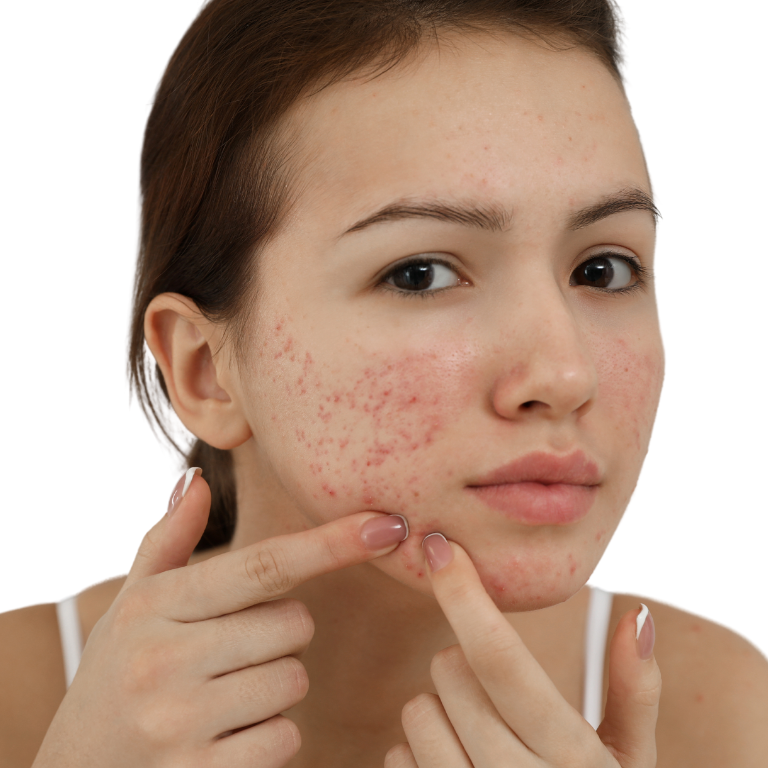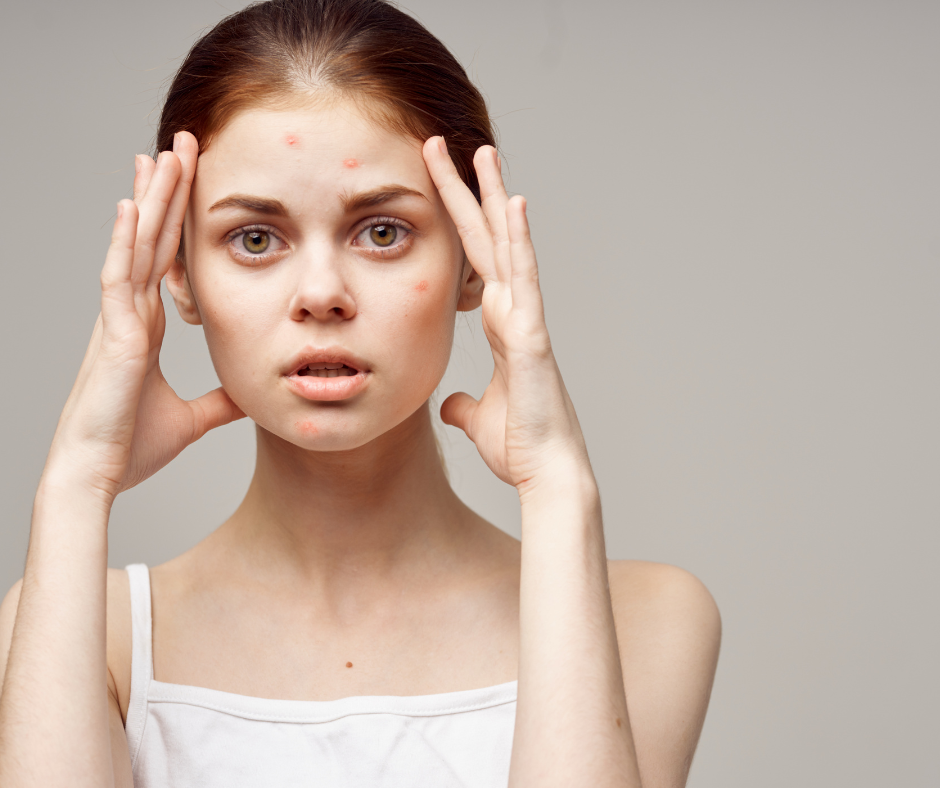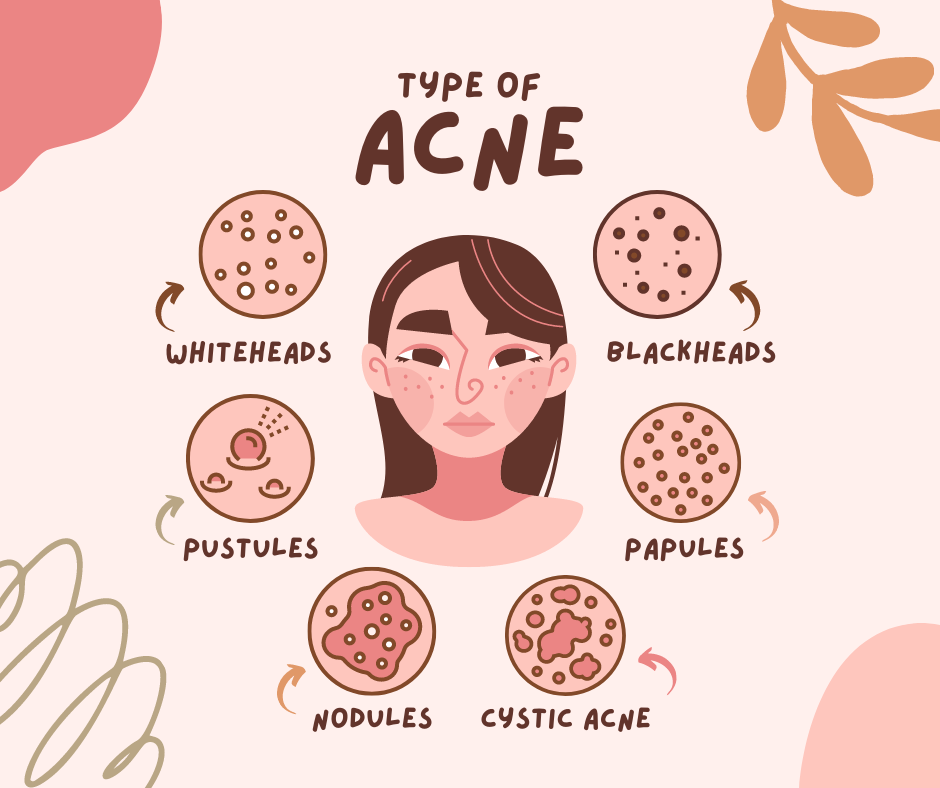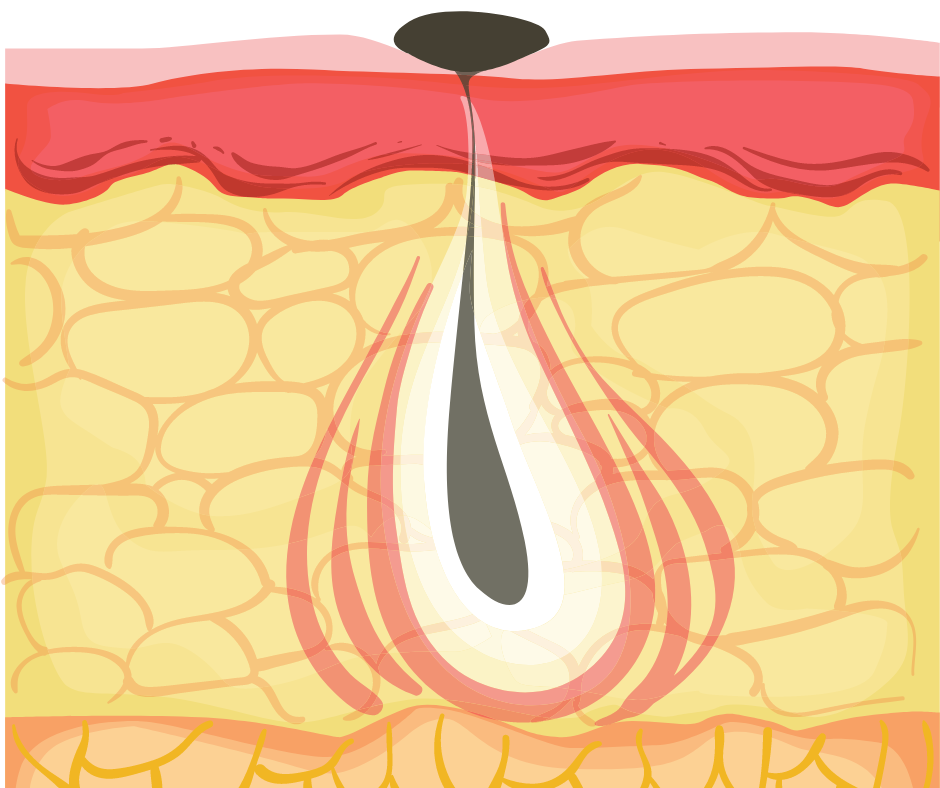
Dealing with ACNE? … here’s all you need to know!

Acne, also called ACNE VULGARIS, is a common chronic inflammatory skin condition.
In 2015, Acne affected approximately 633 million people globally, making it the eighth-most common disease worldwide!
Acne, one of the most common skin disorders, peaks in youth and early adulthood, affecting around 85% of people between the ages of 12 and 24.
Though it is often considered a teenage problem, Acne can occur in people of any age; however, its intensity reduces with age.
Still, over 25% of women and 12% of men in their 40s report having Acne.
“One of the most common reasons adult women between the ages 20 of 40, for example, visit skin clinics is for Acne.
Clinical trial data revealed that approximately 50% of women in their 20s, 33% in their 30s, and 25% in their 40s suffer from Acne.
For those who suffer from Acne, it is not merely a cosmetic problem; the consequence includes emotional stress that can strongly impact one’s self-esteem.

Acne is a category of skin issue that includes pimples, blackheads, and whiteheads, which can appear on the face, back, and chest.
Pimples that contain pus are known as pustules, and those without pus are called papules.
Doctors refer to enlarged or plugged hair follicles, i.e., black and whiteheads are known as comedones.
Acne can be classified based on many factors, including the type of lesions (comedones, papules, pustules, etc.) and severity.
However, there is no universally accepted scale for grading acne severity.
- MILD – Comedonal acne. Comedones and a limited number of pustules and papules are present but without nodules. This type of Acne is often called mild Acne, and most of this Acne appears on the face & very few on the trunk (The central part of the body that contains the chest, abdomen, pelvis, and back).

- MODERATE- Papular, pustular, and non-scarring inflammatory acne. The skin has some comedones and more pustules and papules than in comedonal Acne. No nodules, or only a few, are present. A higher number of inflammatory papules and pustules occur on the face, compared to mild cases of Acne, and appear on the trunk of the body.

- SEVERE- Cystic Acne and scarring acne. Comedones, more pustules and papules than are seen if you are dealing with severe Acne, as well as nodules and/or cysts, are present. Scarring may occur. This type of Acne may also be called severe, cystic, or nodulocystic. The nodules (the painful ‘bumps’ lying under the skin) are the characteristic facial lesions, and the involvement of the trunk is extensive.
Acne scars are caused by inflammation within the dermis and are estimated to affect 95% of people with acne vulgaris. Abnormal healing and dermal inflammation create the scar. Scarring is most likely to occur with severe Acne but may occur with acne vulgaris.
What causes Acne?

Acne, also known as acne vulgaris, is a long-term skin condition that occurs when dead skin cells, oil & bacteria from the skin clog the hair follicles.
(The hair follicles are the small, tube-shaped cavities near the skin surface from which tiny hairs grow).
It primarily affects skin with a relatively high number of sebaceous glands, including the face, upper part of the chest, and back.
Sebaceous glands are connected to the hair follicles under the skin’s surface, and they secrete sebum, an oily substance that travels up the follicle to the surface, moisturizing the skin and hair.
These blockages of sebaceous glands occur as a result of the following four abnormal processes:
- Increased oily sebum production (influenced by testosterone, especially during puberty).
- Excessive deposition of the protein keratin leading to comedo formation.
- Colonization of the follicle by Cutibacterium acnes (C. acnes); It is a type of Gram-positive bacteria that normally live on the skin. When the sebaceous glands produce lots of sebum, C. acnes thrives and reproduces, further clogging the hair follicles and leading to skin inflammation.
- Local release of pro-inflammatory chemicals in the skin.
- The skin needs to breathe; if the pores become clogged, the microbes that are involved in causing Acne flourish as they are protected against the bacteriostatic action of sunshine.
Other Factors triggering Acne:

Genetics: Acne appears to be highly heritable; genetics explain 81% of the variation in the population. There is evidence that people with a family history of Acne are more susceptible. Studies performed in affected twins and first-degree relatives further indicate the strongly inherited nature of Acne.
Hormonal changes can trigger Acne, such as pregnancy, the menstrual cycle (including menopause), and certain medical disorders.

Medications that affect hormonal levels, such as oral contraceptives for some women, can also cause Acne to flare up. Various medications and drugs can trigger Acne, including corticosteroids, hormones, lithium, and anabolic steroids.

Diet. Some studies suggest that a high glycemic diet may contribute to the development or worsening of Acne. High glycemic load foods cause blood sugar levels to rise quickly, such as white bread, processed junk foods, cornflakes, and white potatoes. Other studies have linked the consumption of cow’s milk, particularly skim milk, with Acne. More rigorous research studies are needed to fully validate the role of diet in acne vulgaris.
Endocrine disorders. Certain endocrine conditions, such as polycystic ovary syndrome and congenital adrenal hyperplasia, can raise androgen levels. Most women suffer pre-menstrual acne flare-ups prompted by the release of progesterone after ovulation.

Stress. There is some evidence that emotional stress can exacerbate Acne. Stress affecting the skin is linked to an increase in cortisol and androgens from the stress response associated with a rise in sebum production and resulting cosmogenesis or clogging of sebaceous glands, leading to Acne.

Skincare products. Certain skin care products such as cosmetics, sunscreens, and moisturisers can clog hair follicles and may play a role in the formation of Acne. Therefore, look for skincare products that are “non-comedogenic,” meaning they do not contribute to clogging the pores.
There is satisfactory evidence to support that Acne and associated scarring negatively affect an individual’s psychological state, worsen mood, lower self-esteem, and are associated with an increased risk of anxiety disorders and depression.
However, The good news is there are holistic ways of managing and treating Acne with the help of natural treatments like homeopathy, herbs, diet, supplementation, and nutrition.
I’ll discuss the treatment options for Acne in the upcoming blog, do subscribe to our newsletters, so you can get all the updates about new blogs.
Quisque imperdiet elementum tortor vel pretium
Quisque non tempus ante. Pellentesque eget lectus varius, molestie felis et, rhoncus nisl. Nullam eget mauris quis sem laoreet semper et non tellus. Sed tempus urna sed blandit cursus. Phasellus molestie condimentum egestas. Class aptent taciti sociosqu ad litora torquent per conubia nostra, per inceptos himenaeos. In rutrum posuere orci, at dignissim lacus sagittis ut.
Morbi cursus ipsum at nunc semper, sit amet convallis purus scelerisque. Suspendisse condimentum diam id feugiat sagittis. Nullam erat nulla, auctor id lectus id, dapibus molestie mauris. Nam ultrices metus ac quam varius malesuada. Donec iaculis ipsum eu justo ullamcorper volutpat in vel nisl. Integer vehicula purus in sagittis rhoncus. In quis turpis ac sapien semper lacinia. Donec non metus nibh.
Sed et ante at dui porta condimentum vel nec ante.
Proin dapibus, nunc ac tempor venenatis, tellus tortor hendrerit sem, a sollicitudin neque justo fermentum ante. Quisque non turpis sem. Cras mi quam, congue sit amet elementum ut, egestas vitae felis. Quisque facilisis magna id tortor malesuada, at molestie purus posuere. Aenean eget malesuada odio. Aliquam porta varius molestie. Pellentesque auctor faucibus lectus, in consectetur mauris facilisis at. Donec sollicitudin venenatis orci vel aliquet. Etiam commodo nulla turpis, nec interdum est rutrum at. Sed a dui porta, faucibus leo ac, accumsan risus. Donec posuere faucibus ante, vel viverra nunc blandit ut. In hac habitasse platea dictumst. Maecenas mollis eu metus et eleifend. Nunc ut nunc vitae tellus ornare imperdiet.
